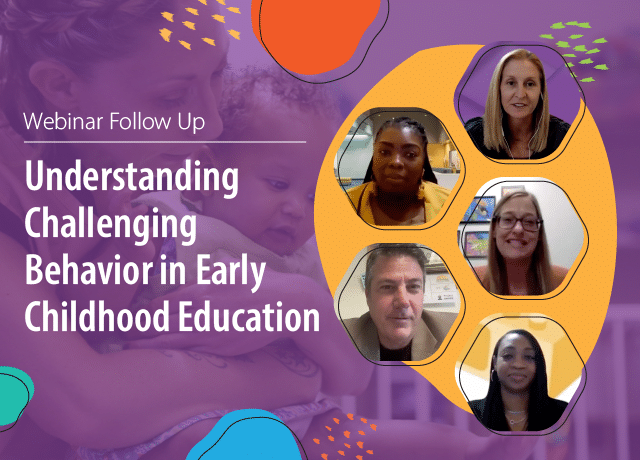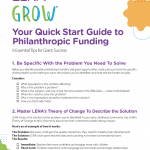Ever wonder why that usually cheerful toddler suddenly throws a fit during circle time? Or why your most engaged preschooler withdraws during group activities? Or why that one child always demands so much of your attention? Welcome to the complex world of early childhood behaviors. It’s a topic we recently explored in our most recent webinar, “Understanding Challenging Behavior in Early Childhood Education.”
In the wake of COVID, educators are noticing a shift. Challenging behaviors seem more frequent, more intense. And what we’ve learned is that these behaviors provide valuable insights into a child’s world.
Our panel of experts, including educators and administrators from Porter-Leath and Rob Corso, Executive Director of the Pyramid Model Consortium, shared fresh perspectives on this timely issue. They emphasized a crucial point: Behind every challenging behavior lies an attempt at communication. It’s up to us, as educators, to decipher and respond to these messages.
But how do we do that effectively? That’s where the power of positive educator-child interactions comes into play. These everyday exchanges, from a warm greeting to a patient explanation to a fun question about imaginative play, shape a child’s behavior and set the stage for lifelong learning.
The Hidden Messages in Challenging Behaviors
When a child throws a tantrum or refuses to participate, they’re not just acting out — they’re speaking to us. Jodi Whiteman, Director of Partnerships and Growth at LENA, emphasizes this point: “They’re not crying just for the sake of crying or acting out just for the sake of acting out. They’re always trying to communicate something.”
This perspective shift is critical in helping us move from simply managing behaviors to truly understanding a child’s needs. But how do we become fluent in this unique language?
The key lies in responsive relationships. These connections, built on engaging interactions, form the foundation for effective communication. And adults play a huge role in teaching children how to communicate effectively.
In the first few years of life, a child’s brain is primed to learn, recognize, and manage emotions. When educators guide this process by responding to challenging behaviors with patience and curiosity, they help children put words to their feelings and find appropriate ways to express them.
By viewing challenging behaviors as attempts at communication, we transform our classrooms. We create spaces where every child feels heard, understood, and supported in their emotional growth. And isn’t that the heart of early childhood education?
Empowering Educators: The Key to Transforming Challenging Behaviors
Educators are facing unprecedented challenges in early childhood classrooms. From increased behavioral issues to workforce shortages, the landscape has shifted dramatically in recent years. Rob Corso, Executive Director of the Pyramid Model Consortium, puts it bluntly: “We are not on the other side of whatever COVID did to our workforce shortages.”
High turnover rates and burnout, issues that plagued the field even before the pandemic, have only intensified. So, how do we support our educators in this new reality? In addition to eliminating economic insecurity among early childhood educators, the answer may lie in part in targeted, efficient professional development.
The impact of providing the right tools to early childhood educators is significant. Take Porter-Leath’s Early Head Start sites, for example. Among teachers who participated in LENA Grow, only 25 percent left their position, compared to more than 60 percent of those who did not participate. It’s a powerful reminder that when we invest in our educators, we’re investing in our children’s futures.
Building Relationships Through Early Language Development
During our webinar, Larissa Fullilove, Social-Emotional Learning Instructional Coach at Porter-Leath, shared a powerful insight: “Language builds relationships, and relationships build language.” This simple yet profound statement captures the essence of early childhood development.
Fullilove emphasized how early literacy experiences — talking, reading, and singing — are crucial for developing vocabulary, comprehension, and communication skills. These skills, in turn, lay the foundation for academic success and social-emotional growth. “Skills such as empathy, cooperation, and self-regulation are built through early talk,” she explained. By focusing on language-rich interactions, educators can foster secure attachments and help children manage their emotions more effectively. This, in turn, reduces the amount and intensity of challenging behaviors inside and outside the classroom.
How One Teacher Tackles Challenging Behaviors
In the webinar, Rochelle Lewis, an Early Head Start Educator at Porter-Leath, shared practical insights from her classroom. “A lot of our children are not vocal, and they cannot use their language to tell us what it is that they want,” Lewis explained. This communication gap often leads to challenging behaviors.
Lewis’s solution? Teach children the words they need. By giving children a vocabulary for their emotions, Lewis helps them move from disruptive behaviors to effective communication.
Lewis also emphasizes the importance of validating children’s feelings and understanding the root causes of their behaviors by acknowledging and addressing their underlying needs. This approach not only manages immediate behaviors but also builds crucial emotional regulation skills for the future.
With Challenging Behavior, Communication Is Key
As we wrap up our journey through the world of challenging behaviors, one thing is clear: Communication is key. By focusing on building strong relationships, enhancing our professional skills, and giving children the words to express their feelings, we can create more positive, nurturing environments for our youngest learners.
Remember, tools like LENA Grow can help by providing data-driven insights to enhance educator-child interactions. But even simple strategies, like teaching emotion words, can make a big difference in your classroom.
Want to dive deeper into supporting children’s emotional development? Download our free “Talk About Emotions” resource for practical strategies you can implement today. And if you missed our webinar or want to revisit the insights shared, you can watch the full replay here. Together, we can turn challenging moments into opportunities for growth and connection.
[callout]



